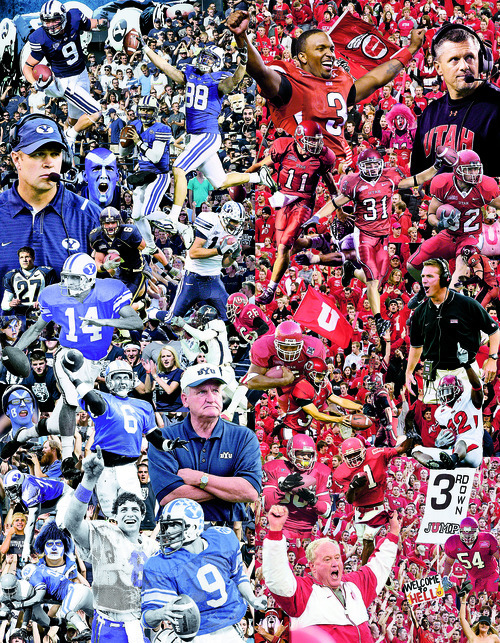This is an archived article that was published on sltrib.com in 2010, and information in the article may be outdated. It is provided only for personal research purposes and may not be reprinted.
After playing for BYU and coaching for Utah in rivalry games, Ute defensive coordinator Kalani Sitake smiles wryly when he's asked to imagine how the football series will change when the schools no longer belong to the same conference.
Sitake's forecast: much hotter.
Well, the temperature at kickoff in mid-September could be 60 degrees higher than in the traditional late-November time slot.
Otherwise, nobody's sure how much heat and intensity — if any — will be lost when conference championships and instant bowl invitations are removed from BYU-Utah games. What's certain is that change is coming at a time when the rivalry is more competitive than ever.
Only the Utes are ranked this season, and unless planets collide and TCU loses at New Mexico, a Mountain West Conference co-championship isn't in play Saturday at Rice-Eccles Stadium.
Yet, of the three BYU-Utah meetings ever pairing Top 25 opponents, two came in 2008 and '09.
The series stands 5-5 in this century and 10-10 during the past 20 years. After decades of domination by Utah, followed by BYU's sudden reversal under LaVell Edwards, Utah's Ron McBride restored some balance in the 1990s. The back-and-forth nature of the rivalry has continued between BYU's Bronco Mendenhall and Utah's Kyle Whittingham.
With the Utes joining the Pac-12 and BYU becoming an independent, the teams will meet in the third week of the 2011 season.
"The game carries so much weight, anyway," Mendenhall said. "I don't think it would matter if we were in the same conferences, different conferences. … The tradition of the game holds enough, regardless of what other things you add to it."
While Utah and BYU have met Nov. 17 or later every year since 1978, only once were both teams playing for an outright conference championship. That was in 1981, when Whittingham was a BYU senior linebacker and the Cougars won 56-28.
It also is true that, in 2004 and 2008, Utah's joy in qualifying for Bowl Championship Series games was enhanced by beating BYU at Rice-Eccles to end the regular season.
"It made it a little bit more sweet," said Brian Johnson, a quarterback for those teams.
Even the gracious Edwards was once moved to say after clinching a conference title in Salt Lake City, "I can't think of a better place … to win a championship."
Yet after nearly 90 years of conference competition, the schools will have different reference points.
"That's going to cancel a lot of that stuff," McBride said in a KUED documentary.
Some precedents exist in the study of how the rivalry may or may not change. Long before BYU-Utah became what Whittingham labels "the biggest event in the state of Utah, over the course of the year," the biggest football game paired Utah and Utah State in November.
That remained true for many years after Utah and BYU moved from the Skyline Conference to the Western Athletic Conference in 1962 and USU became independent (not by choice). Eventually, BYU's improvement, USU's decline, conference affiliation, geography and religious factors all conspired to make BYU-Utah more important.
In the Pac-12, however, the Utes will have no opponent closer than 500 miles. Colorado and Utah will meet in the Thanksgiving weekend slot next year and a rivalry should develop, but that will take a while.
Another comparison: TCU vs. Southern Methodist. For more than 75 years, the Dallas-Fort Worth schools competed in the Southwest Conference, and then the WAC, before separating. The teams didn't meet one year (2006), but the battle for the Iron Skillet has passionately resumed and is booked every September through 2017.
Obviously, the approach and the aftermath of BYU-Utah will be different when the teams play in mid-September, as scheduled the next two seasons.
Next year, Utah will just have played its inaugural Pac-12 game at USC and BYU will be coming off a high-profile contest at Texas.
The rivalry game will come and go, without the season-long buildup or the lengthy recovery for the loser.
Having experienced the Louisville-Kentucky rivalry in season openers as a UK assistant coach, McBride hopes the same thing happens someday with BYU-Utah, creating a summer of anticipation.
Regardless of how the future affects the rivalry, though, nothing should change dramatically, anytime soon.
"No matter what," said Johnson, now Utah's quarterbacks coach, "everybody's going to be jazzed up about it."
kkragthorpe@sltrib.comTwitter: @tribkurt —
Other rivalries
Interconference rivalry games and when they're traditionally played:
Game, month
Louisville vs. Kentucky • September
Iowa vs. Iowa State • September
Colorado vs. Colorado State • September
TCU vs. Southern Methodist • September
Illinois vs. Missouri • September
New Mexico vs. NewMexico State • September
USC vs. Notre Dame • October*
Clemson vs. South Carolina • November
Georgia vs. Georgia Tech • November
Florida vs. Florida State • November
* November when playedat USC.



